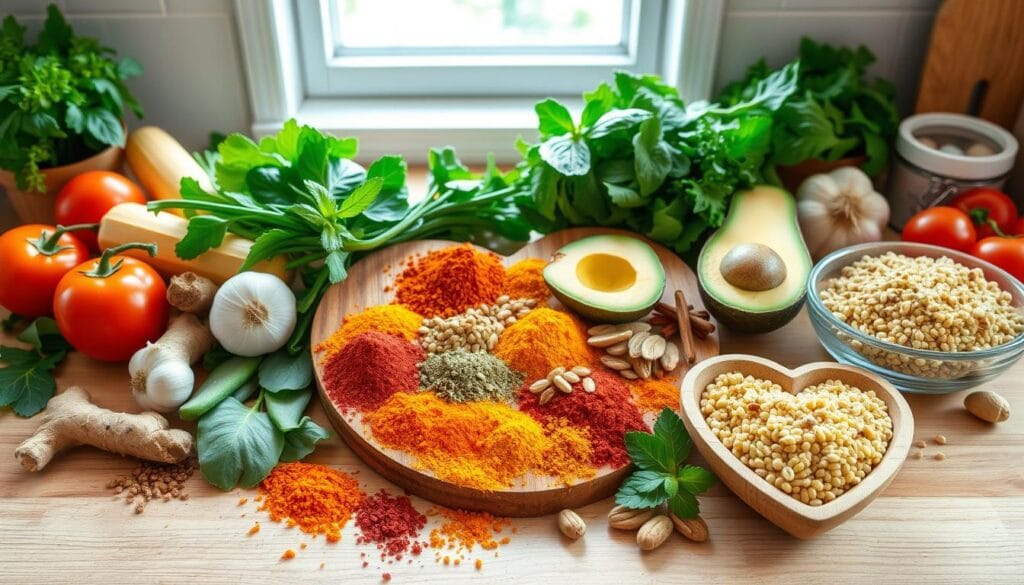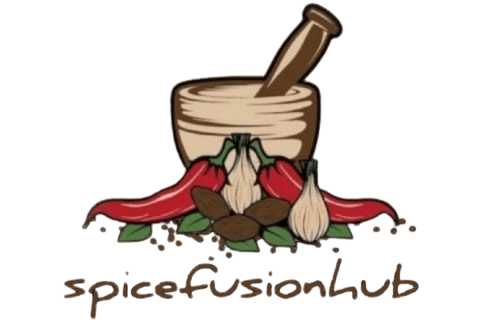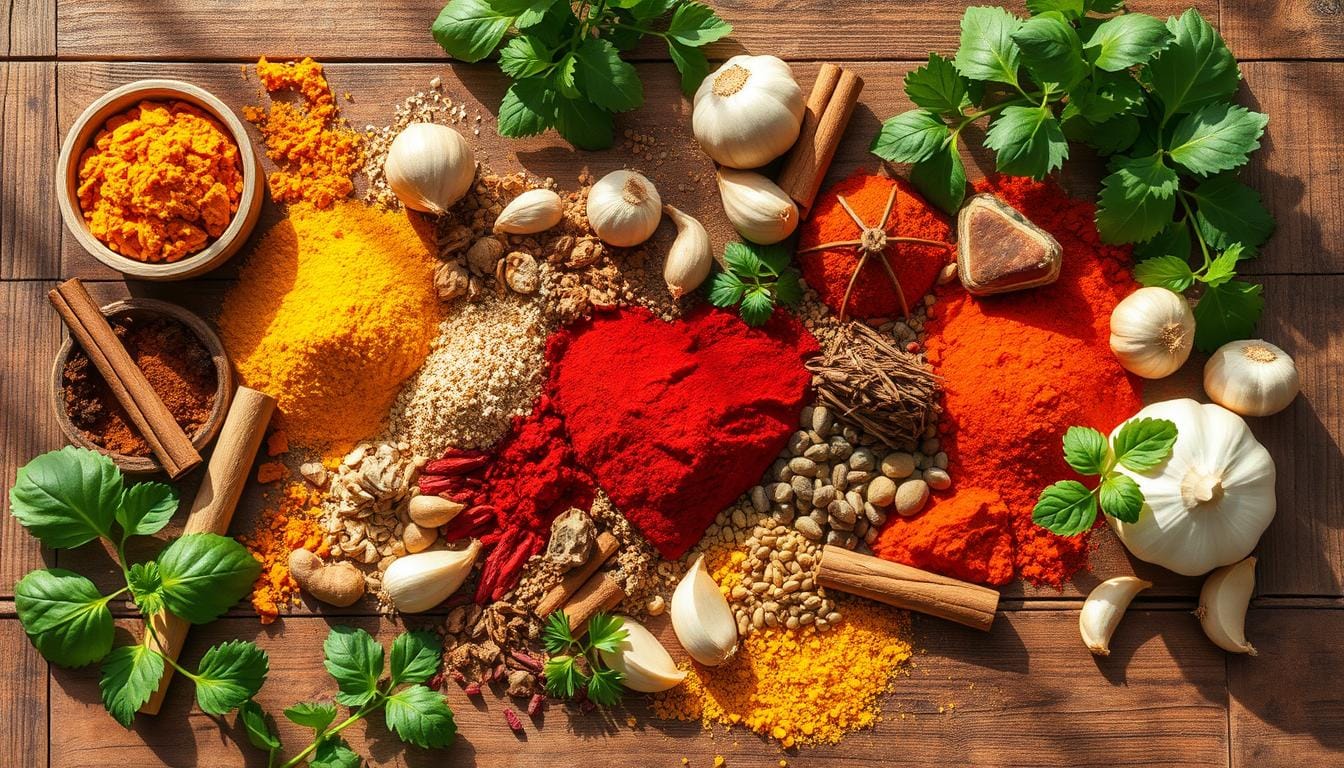Spices for Heart Health: Unlock Nature’s Secrets
Have you ever thought about how a small amount of spice could improve your heart health? The link between spices and heart health is both interesting and backed by science. Adding heart-healthy spices to your meals is not just tasty; it’s a smart way to boost your heart health.
From old remedies to today’s nutrition tips, spices are key to better heart function. In this article, we’ll uncover the secrets of these natural ingredients. We’ll see how they can help your heart stay healthy.
Key Takeaways
- Explore the remarkable benefits of spices for heart health.
- Understand the significance of a heart-healthy diet.
- Discover which spices can boost cardiovascular wellness.
- Learn how spices contribute to overall nutrition.
- Find out how simple dietary changes can lead to significant health benefits.
Understanding Heart Health and Nutrition
Keeping your heart healthy is key to feeling good. Eating right is a big part of this. A diet that’s good for your heart can help prevent heart disease and make you live longer. It includes foods that help your heart work well and keep you safe from harm.
Importance of a Heart-Healthy Diet
A heart-healthy diet is all about eating whole foods. This means lots of fruits, veggies, whole grains, and healthy fats. It’s not just good for your heart. It also helps with inflammation and gives you important nutrients. Eating this way can make you feel more energetic and healthier overall.
Key Nutrients for Heart Health
There are a few nutrients that are super important for your heart. These include:
- Omega-3 fatty acids, found in fish, flaxseeds, and walnuts, support heart function.
- Fiber, present in fruits, vegetables, and whole grains, helps lower cholesterol levels.
- Antioxidants, which are abundant in berries and green leafy vegetables, protect the heart from oxidative stress.
The Role of Spices in Nutrition
Spices add flavor to our food and are packed with health benefits. Adding spices like turmeric, garlic, and cinnamon to your meals can make your diet even better. They can help lower blood pressure and improve cholesterol levels. This makes it easy to enjoy tasty food while taking care of your heart.
Top Spices Beneficial for Heart Health
Spices add flavor to our meals and offer health benefits. Some spices are especially good for heart health. We’ll look at turmeric, cinnamon, and garlic, each with its own heart health benefits.
Turmeric: The Golden Spice
Turmeric is famous for its bright color and taste. It contains curcumin, which is great for the heart. Curcumin fights inflammation, which is key for heart health.
It also helps blood vessels work better. This is important for keeping the heart healthy.
Cinnamon: More Than Just a Flavor
Cinnamon is known for its sweet smell. It helps control blood sugar, which is good for the heart. By keeping blood sugar in check, cinnamon lowers heart disease risk.
It also has antioxidants that fight stress in the body. This helps overall health.
Garlic: A Natural Heart Protector
Garlic is loved for its health benefits. It lowers cholesterol and blood pressure. This improves blood flow and heart function.
| Spice | Heart Health Benefits | Key Component |
|---|---|---|
| Turmeric | Anti-inflammatory effects, improved endothelial function | Curcumin |
| Cinnamon | Blood sugar regulation, antioxidant properties | Cinnamaldehyde |
| Garlic | Lower cholesterol, improved blood pressure | Allicin |
How Spices Support Cardiovascular Health
Spices are key to keeping our hearts healthy. They fight oxidative stress and inflammation, big enemies of heart disease. Adding them to our meals can make our hearts stronger.
Antioxidant Properties Explained
Spices have antioxidants that fight off harmful free radicals. These free radicals can harm our blood vessels and lead to heart problems. Turmeric and cinnamon, for example, are packed with antioxidants. They protect our cells and help keep our hearts healthy.
Anti-Inflammatory Benefits of Spices
Chronic inflammation is bad for our hearts, leading to diseases like atherosclerosis. Spices like ginger and cayenne pepper can help. They reduce inflammation, which improves heart function and lowers heart disease risk.
Regulation of Blood Pressure
Keeping blood pressure in check is vital for heart health. Some spices can help with this. Garlic and cardamom, for instance, can lower blood pressure. Eating these spices regularly helps keep our hearts in top shape.
| Spice | Antioxidant Properties | Anti-Inflammatory Benefits | Blood Pressure Regulation |
|---|---|---|---|
| Turmeric | High | Yes | No |
| Cinnamon | High | Yes | Yes |
| Garlic | Moderate | Yes | Yes |
| Ginger | Moderate | Yes | No |
| Cardamom | Moderate | No | Yes |
Turmeric: The Heart-Health Powerhouse
Turmeric is a standout spice for heart health. Its key ingredient, curcumin, has been shown to boost heart function. This can lower the risk of heart disease and improve overall heart health.
Active Compound: Curcumin
Curcumin is known for its bright color and health benefits. It has strong anti-inflammatory and antioxidant properties. These help fight oxidative stress and inflammation, key in preventing heart disease.
Regular turmeric intake can improve heart function. It also lowers the risk of heart problems.
How to Incorporate Turmeric into Your Diet
Adding turmeric to your diet is easy and tasty. Here are some ways to enjoy it:
- Add turmeric to smoothies for a bright flavor and health boost.
- Use it in cooking by seasoning soups, stews, or curries.
- Prepare a soothing turmeric tea by boiling water with fresh turmeric or turmeric powder.
- Mix turmeric into salad dressings or marinades for an engaging twist.

These methods add flavor to your meals and boost heart health. Adding turmeric to your daily routine can greatly benefit your heart.
The Heart Benefits of Cinnamon
Cinnamon is a special spice known for its rich flavor and heart benefits. It plays a big role in controlling blood sugar, which is key for heart health. Cinnamon helps keep blood sugar levels steady, preventing spikes that can harm the heart.
Blood Sugar Control and Heart Health
Keeping blood sugar in check is vital for heart health. Research shows cinnamon boosts insulin sensitivity, helping manage glucose better. Stable blood sugar levels lower heart disease risks. Adding cinnamon to meals is a great way to support heart health. For more on spices like cinnamon, check out this link.
Delicious Ways to Enjoy Cinnamon
It’s easy to add cinnamon to your diet. Here are some tasty ways to enjoy it:
- Sprinkle cinnamon on your morning oatmeal or cereal for a flavorful start.
- Add it to smoothies for an extra boost of flavor and nutrition.
- Mix cinnamon in baked goods such as muffins or cookies for a delightful taste.
- Incorporate cinnamon into savory dishes like chili or curry for added warmth.
These options not only make meals more delicious but also boost heart health. Explore different ways to use cinnamon and enjoy its health benefits.
Garlic: The Natural Heart Helper
Garlic is a powerful ally for heart health. It helps lower cholesterol levels. This makes it a favorite for those wanting to keep their heart healthy.
Garlic adds flavor to many dishes. It also helps keep the heart healthy.
How Garlic Reduces Cholesterol
Studies show garlic can lower LDL cholesterol. This is the “bad” cholesterol. Eating garlic can greatly benefit heart health.
This cholesterol drop lowers heart disease risk. Garlic is key for those aiming to prevent heart issues.
Clove vs. Supplement: What’s Better?
Choosing between raw garlic and supplements depends on you. Raw garlic gives a strong dose of heart-healthy compounds. Supplements are handy for a busy life.
| Type | Benefits | Considerations |
|---|---|---|
| Raw Garlic | Rich in active compounds for cholesterol reduction | Strong flavor, may cause digestive discomfort |
| Garlic Supplements | Convenient, standardized dosage | Potential for varying quality; not always as effective |
The Impact of Spices on Cholesterol Levels
Knowing about cholesterol is key to keeping your heart healthy. Cholesterol is divided into LDL and HDL types. LDL is called *bad cholesterol* because it can harm your heart. HDL, on the other hand, is known as *good cholesterol* because it helps keep your arteries clear.
Understanding LDL and HDL Cholesterol
LDL cholesterol can build up in your arteries, causing blockages. This increases your risk of heart problems. HDL cholesterol, however, helps remove cholesterol from your blood. It’s important to keep both types of cholesterol in balance for good health.
Spices that Boost Good Cholesterol
Some spices can help improve your cholesterol levels. Adding these spices to your meals can boost your good cholesterol. Here are some spices known for their cholesterol-lowering effects:
| Spice | Effects on Cholesterol | Notes |
|---|---|---|
| Turmeric | May lower LDL, boost HDL | Contains curcumin, promoting heart health |
| Cinnamon | Can reduce LDL levels | Acts as a natural sweetener |
| Garlic | Supports HDL levels | Can be consumed raw or cooked |
Adding these spices to your meals is a tasty way to support your heart health. They can help balance your LDL and HDL cholesterol levels. This can lead to a healthier heart.
Spices as Part of a Heart-Healthy Lifestyle
Adding spices to your meals can boost your heart health. Spices not only make food taste better, but they also offer health benefits. It’s fun and rewarding to make spices a part of your daily routine.
Integrating Spices into Your Daily Routine
There are many ways to add spices to your cooking:
- Start with familiar favorites: Use spices like garlic and cinnamon in dishes you already enjoy.
- Add to smoothies: A sprinkle of turmeric or ginger can boost nutritional value while adding a vibrant flavor.
- Season vegetables: Enhance roasted or steamed vegetables with a mix of spices for a delightful taste explosion.
- Experiment with marinades: Incorporate heart-healthy spices into marinades for meats or tofu, offering a flavorful twist.
- Try spice blends: Create custom blends that combine several spices for versatility in your meals.

Other Lifestyle Changes for Heart Health
A heart-healthy lifestyle is more than just spices. Here are other important changes:
- Regular physical activity: Aim for at least 150 minutes of moderate exercise weekly to keep your heart strong.
- Mindful eating: Focus on whole foods and balanced meals, reducing processed foods to lower sodium and unhealthy fats.
- Stress management: Incorporate relaxation techniques such as meditation, yoga, or deep-breathing exercises to support heart health.
- Stay hydrated: Drink plenty of water to facilitate overall bodily functions essential for heart activity.
- Adequate sleep: Strive for 7-9 hours of restful sleep nightly to help your body recover and regulate heart health.
Cultural Uses of Heart-Healthy Spices
Spices have been a big part of cultures worldwide for centuries. They add flavor to food and help keep us healthy. Many traditions use spices in special ways, showing how food and health are connected. This section looks at these traditions and shares recipes that are good for your heart.
Traditional Uses Around the World
Every region has its own way of using spices, based on history and local ingredients. For example:
- Indian cuisine often uses turmeric and ginger in curries and teas. These spices help the heart.
- Middle Eastern dishes include cinnamon and cardamom. They’re used in both savory and sweet dishes, showing their value in medicine.
- Mexican culinary practices use garlic and chili in salsas and soups. They add flavor and are good for health.
Recipes Featuring Heart-Healthy Spices
Cooking with spices makes meals both tasty and healthy. Here are some recipes with heart-healthy spices to try:
| Recipe | Main Spices | Health Benefits |
|---|---|---|
| Turmeric Chicken Curry | Turmeric, Ginger | Anti-inflammatory, Rich in antioxidants |
| Cinnamon Spiced Oatmeal | Cinnamon | Regulates blood sugar, Heart health support |
| Garlic Roasted Vegetables | Garlic | Lowers cholesterol, Boosts immunity |
Precautions and Potential Side Effects
Spices can make meals taste great and offer health benefits. It’s important to know about spice precautions, especially for people with health issues or on medications. Knowing the side effects of spices can help avoid risks and make meals healthier.
Who Should Be Cautious with Spices?
Some people should be careful when using spices in their food. Here are some groups to consider:
- People with allergies: Spices like cumin or coriander can cause allergic reactions.
- Individuals with gastrointestinal issues: Spices might make conditions like IBS or ulcers worse.
- Pregnant or breastfeeding women: Spices like sage or rosemary should be used with caution.
- Those with chronic health conditions: People with liver or kidney problems might need to limit spice use.
Interactions with Medications
Spices can interact with medications, which is a big concern. It’s crucial to talk to a doctor before adding spices to your diet. Some spices can affect how well medications work, leading to serious issues.
| Spice | Potential Interaction |
|---|---|
| Garlic | May enhance the effects of blood thinners, increasing bleeding risk. |
| Cinnamon | Can affect blood sugar levels, impacting diabetes medications. |
| Turmeric | May reduce the effectiveness of certain cancer therapies. |
| Ginger | Could interfere with anticoagulants, raising concerns for patients on these medications. |
Future Research on Spices and Heart Health
Research is ongoing to see how spices can help heart health. These studies look at the special compounds in spices. They aim to understand how these compounds affect the heart.
These findings could lead to new ways to prevent heart disease. This is exciting news for those looking to keep their hearts healthy.
Recent Studies and Their Findings
Recent studies show that some spices have anti-inflammatory and antioxidant effects. These effects are good for the heart. For example, garlic and turmeric have been found to be beneficial.
This research suggests that eating spices regularly can improve heart health. It’s a promising discovery for heart health.
Potential of Spices in Heart Disease Prevention
Future research shows that spices could play a big role in preventing heart disease. Adding spices to our diets could boost our heart health. This is because spices are full of good phytochemicals.
Understanding how spices work can help us make better food choices. This could lower the risk of heart disease. For more information, check out this review.
Summary: Embrace Spices for Better Heart Health
Diet plays a big role in heart health, and adding heart-healthy spices is a tasty way to help. Spices like turmeric, cinnamon, and garlic are packed with benefits for the heart. By adding these spices to our food, we can make our meals not only delicious but also good for our hearts.
Encouragement to Get Creative with Spices
Spices can turn simple meals into health boosts. Try new spice blends, marinades, or even smoothies. Spices are versatile, making it simple to add them to your meals.
Lasting Impact on Heart Health Through Diet
A heart-healthy diet has a lasting effect. By choosing to eat more spices and nutritious foods, we can lower heart disease risk. Let spices be your guide to a healthier heart and a better lifestyle!







